TASK FORCE ON ANTI-BLACK RACISM FINAL REPORT
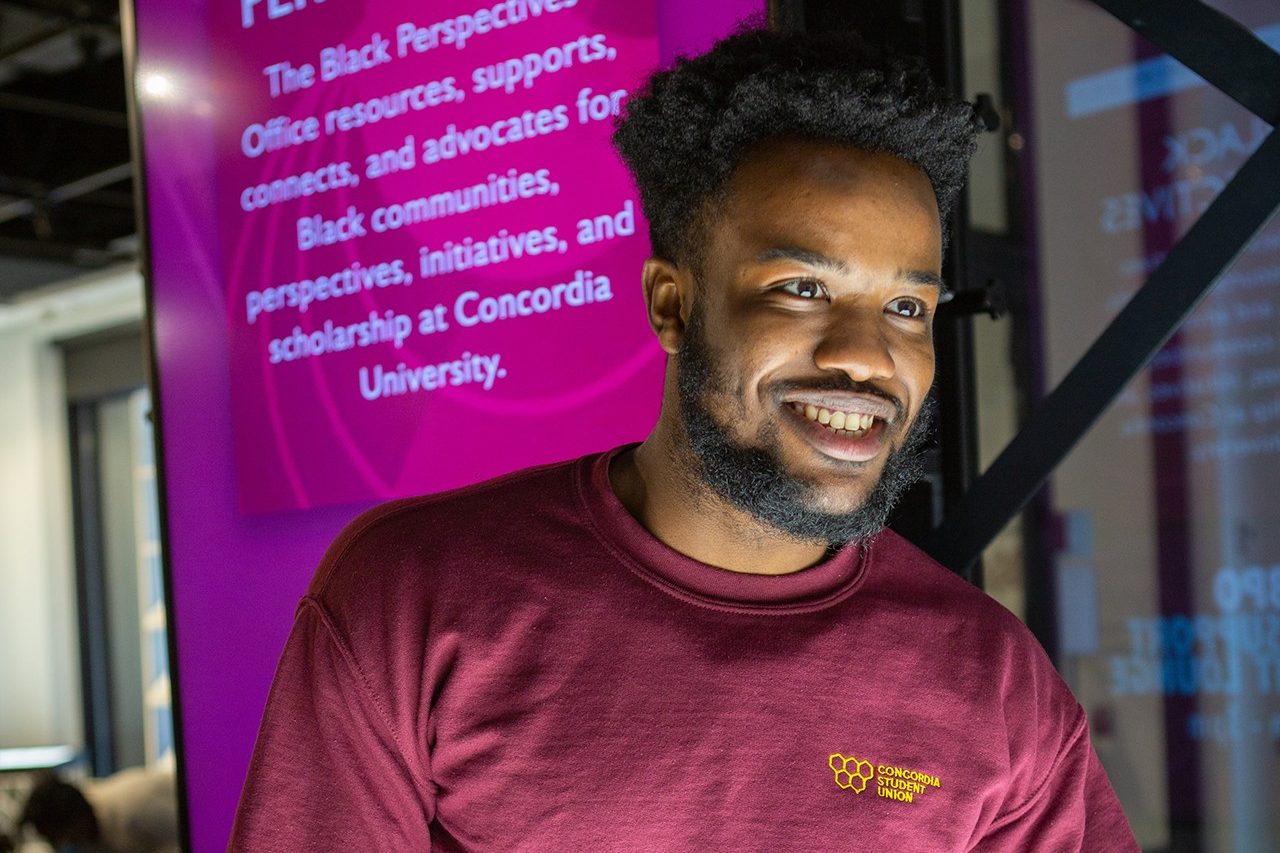
As a result of calls echoed worldwide for systemic and structural change in the face of historical anti-Black racism and white supremacy, the President of Concordia University launched a Task Force on Anti-Black Racism in the fall of 2020. The Task Force was mandated to coordinate the work needed to generate recommendations anchored in the lived experiences of Black faculty, staff and students, in employment, policies, teaching and learning practices, etc. This historic report is the culmination of two years of community consultations, interviews, archival research, literature reviews, town halls and stakeholder conversations, taken on by some fifty Task Force members solicited from among Concordia’s Black community, and spread over initially eight and subsequently six subcommittees.
The Task Force’s recommendations, which align with several of Concordia’s Strategic Directions, emerged along four main axes
Driving institutional
change
Addresses the legacy of the 1969 student protest; the need for a university-wide anti-racism strategy; disaggregated data collection to better serve Black Concordians; training modules that address anti-Black racism in different domains of the university; and a fundraising strategy to support Black-centred initiatives.
Fostering black
flourishing
Encompasses hiring, career advancement and leadership of Black staff, faculty and librarians; the recruitment, retention and graduation of Black students and programs that contribute to their success; a shift in focus for campus security personnel to community safety rather than policing; and mental health services for Black Concordians.
Supporting black
knowledges
Focuses on Black Canadian Studies programs; Black perspectives in curriculum across the university; Black-centred research and a Black Knowledges Hub.
Encouraging
mutuality
Calls for interconnected approaches to confronting anti-Black racism within the university and committed relationships with Black community partners.
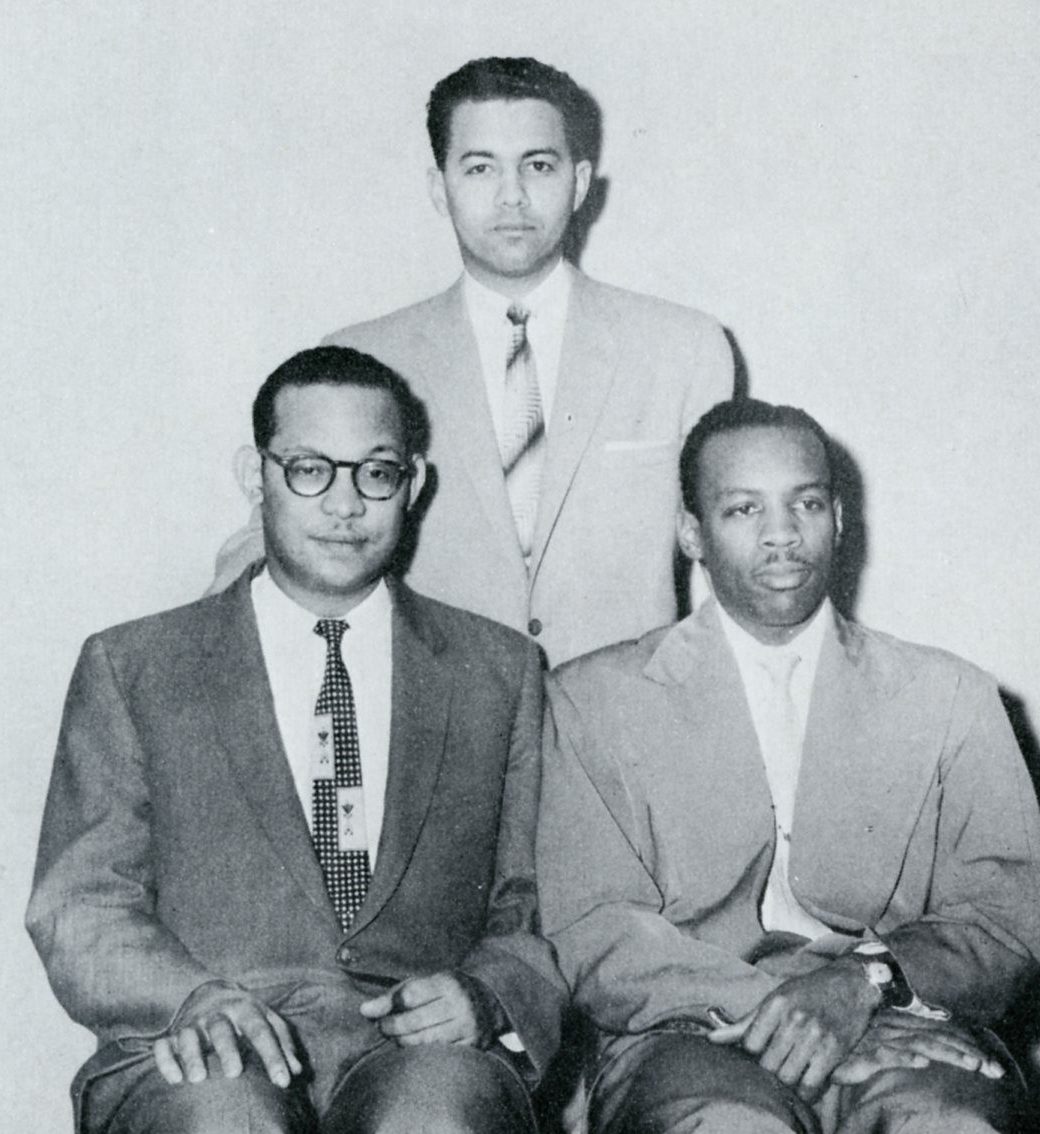
West Indian Society executive committee in Sir George Williams University yearbook (1958) Source: Concordia University Records Management and Archives
A parallel evolution of Concordia University and its Black presence
In order to properly contextualize the recommendations, we have created a timeline that attends to the history of Concordia in relation to Black presence, inclusion and discrimination. The timeline not only highlights the long history of Black presence at Concordia, but it also demonstrates the “ongoingness” of the advocacy and struggle for Black inclusion. The events highlighted in the timeline, along with the history of Black presence in Montreal in the context of higher education institutions, indicate the interconnections that exist between the intersectional realities of the Black experience at Concordia and in Montreal, and the work that still needs to be done at Concordia and to which the university must commit through dedicated actions and resources.
1889
Foundation of Loyola College, an extension of an English program at the Jesuit Collège Sainte-Marie de Montréal.
The Montreal YMCA evening adult education program becomes Sir George Williams College.
1926
1947
Montrealer Harold Herbert Potter is hired to teach at Sir George Williams College, becoming the first Canadian-born Black sociologist to be hired by a post-secondary institution in the country. Potter is promoted to assistant professor in 1949 and to full professor in 1963.
Sir George Williams College is officially chartered as a university and becomes Sir George Williams University (SGWU).
1948
1953
The West Indian Society is founded at SGWU.
The number of students from the Caribbean at SGWU increases, partly due to changes in immigration legislation.
1960s
1968
April: Six Black students make a formal report to the Dean of Students, Magnus Flynn, about their experiences of racism in a biology course at SGWU.
October 4 – 6: A conference entitled “Problems of Involvement in Canadian Society with Reference to Black Peoples” is held at SGWU. It is organized by the Canadian Conference Committee (formerly Caribbean Conference Committee), which includes SGWU lecturers and students.
October 11 – 14: A conference entitled “Congress of Black Writers: Toward the Second Emancipation–The Dynamics of Black Liberation,” is held at McGill University. It is organized by students from McGill University, SGWU and community members.
December: An article by Phil Griffin entitled “Black Students’ Association initiates studies program” appears in The Georgian, a SGWU student newspaper. The article describes the initiative and the scheduled program for lectures from guest speakers.32 The proposal for an informal Black Studies program is presented to the co-curriculum committee by Professor C. Davis, Leroy Bucher, and Phil Griffin.
The West Indian Society becomes the Caribbean Students Union.
January 17: The first informal Black Studies program is launched by three Black professors in collaboration with Black students in which Black lecturers from the United States are invited to discuss Black identity from the viewpoint of various disciplines.
January 29 – February 11: Students occupy the University’s computer centre and faculty lounge in protest of alleged racism at the University. Police are called in on February 11; students are violently arrested. This is followed by lengthy legal trials for those arrested. The day prior to the occupation, The Georgian devotes its entire publication (12 pages) to the position taken by Black students and the university’s response to that position.
February 7: An article by Phil Griffin is published in The Georgian. It is entitled “SGWU and the Black Studies program ‘… unresponsive, apathetic”
November 5: An article in The Georgian reports on a racist cartoon published in the student journal, The Paper, by its editor and publisher Wayne Gray. The cartoon was termed “the most offensive example of racism ever published at SGWU” by the Executive Committee of the Students’ Association, who formally brought code of conduct charges against Gray. The cartoon depicts two barefooted Black men with spears and a sign that says, “Pack your kit bag, Alfred, they are about to start a Black Studies Program in Sir George.”
November 5, 11: A questionnaire is published in The Georgian by the Caribbean Students’ Society of Sir George to determine the interest of students in a Black Studies program at SGWU.
November 12: A letter to the editor in The Georgian features a derogatory comment by student John Sedley on Black students’ demands for a Black Studies program.
1969
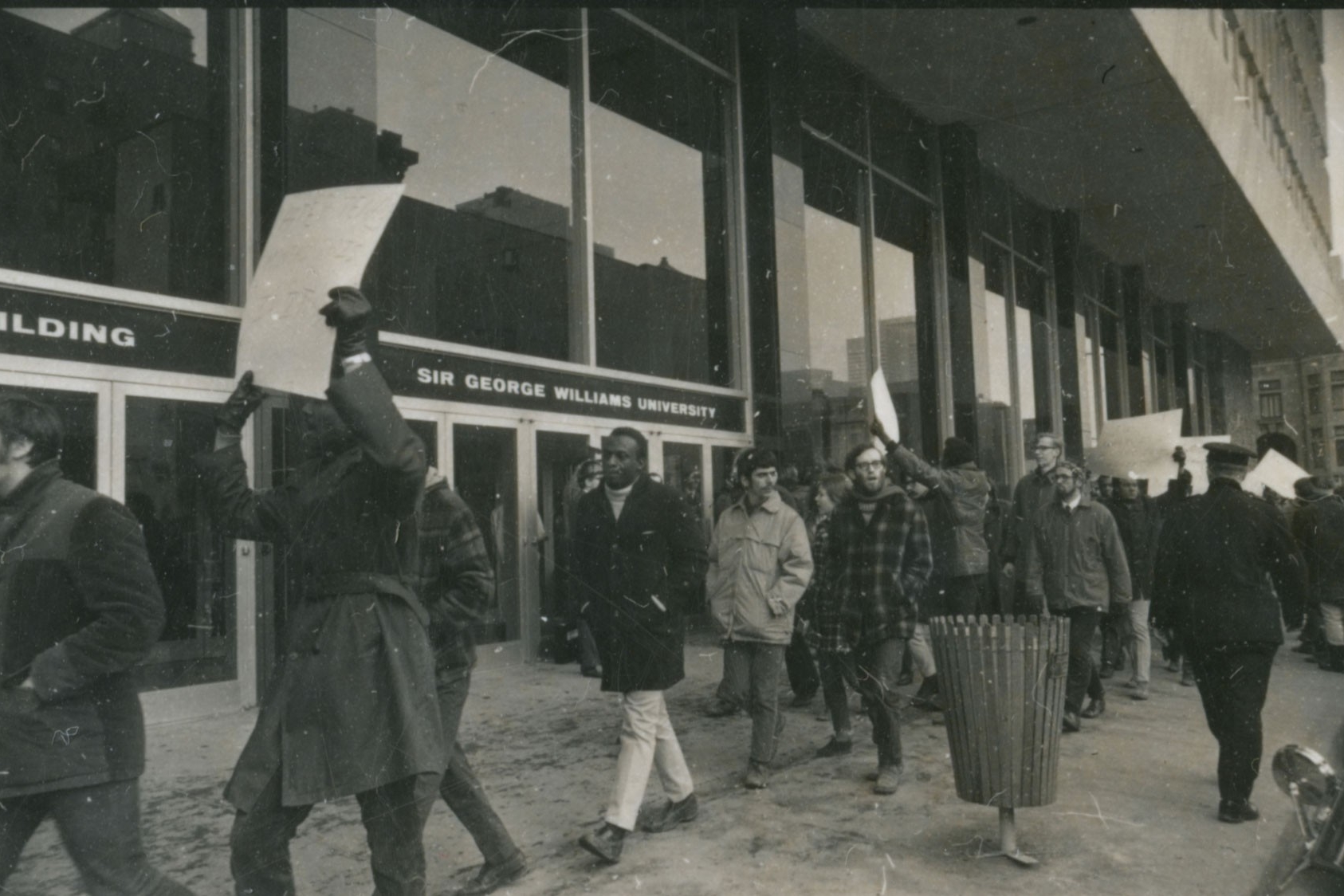 Students protest against racism outside Hall Building at Sir George Williams University (1969). Source: Concordia University Records Management and Archives
Students protest against racism outside Hall Building at Sir George Williams University (1969). Source: Concordia University Records Management and Archives
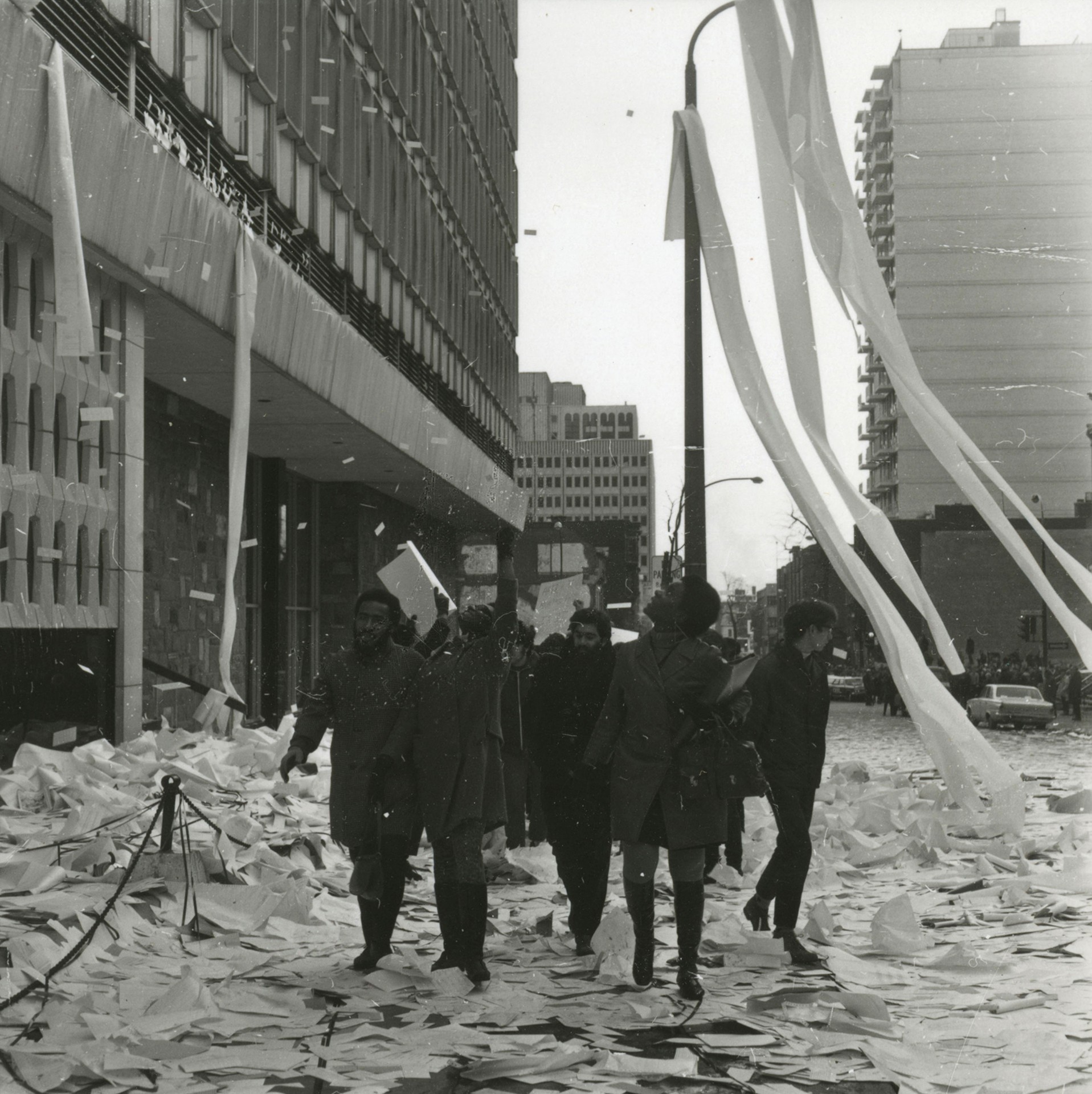 Debris outside the Hall Building following the arrest of protesting students, (February 11, 1969). Source: Concordia University Records Management and Archives
Debris outside the Hall Building following the arrest of protesting students, (February 11, 1969). Source: Concordia University Records Management and Archives
Late
1969
The Black Students’ Association is founded.
January: A report is prepared by James H. Whitelaw (Coordinator of Academic Planning, Sir George Williams University) entitled “Ethnic Groups at the University.” The report delineates the various groups at the university and pays particular attention to the subject of Black Studies. It also lays out the evolution and description of Black Studies programs at other North American universities.
January 30: An event is held at SGWU featuring Professor Nathan Hare from Howard University (Washington, D.C.) and Dr. C.L.R. James from SGWU to discuss Black Studies, various types of Black Studies programs and the Black Revolution.
1970
1972
February 4: An Afro-American seminar is held at SGWU with Professors Chris Lash, John Swede, Leon Jacobs and Norman Cook discussing Black history and culture.
January: The Black Studies Centre is founded by Dr. Clarence Bayne, an assistant professor of quantitative methods, and by Adrien Espinet and Leighton Hutson. It is initially housed at Concordia University. This initiative develops from a group involved in the Research Institute of the National Black Coalition between 1971 and 1974.
1973
1974
Loyola College and Sir George Williams University merge to found Concordia University.
February 4: 125 students, faculty and administrators from across the university come together in a special seminar series, Roadblocks to Education, to discuss major problems impacting students in university. Among many of the requests, students stress the need for a Black Studies program.
1977
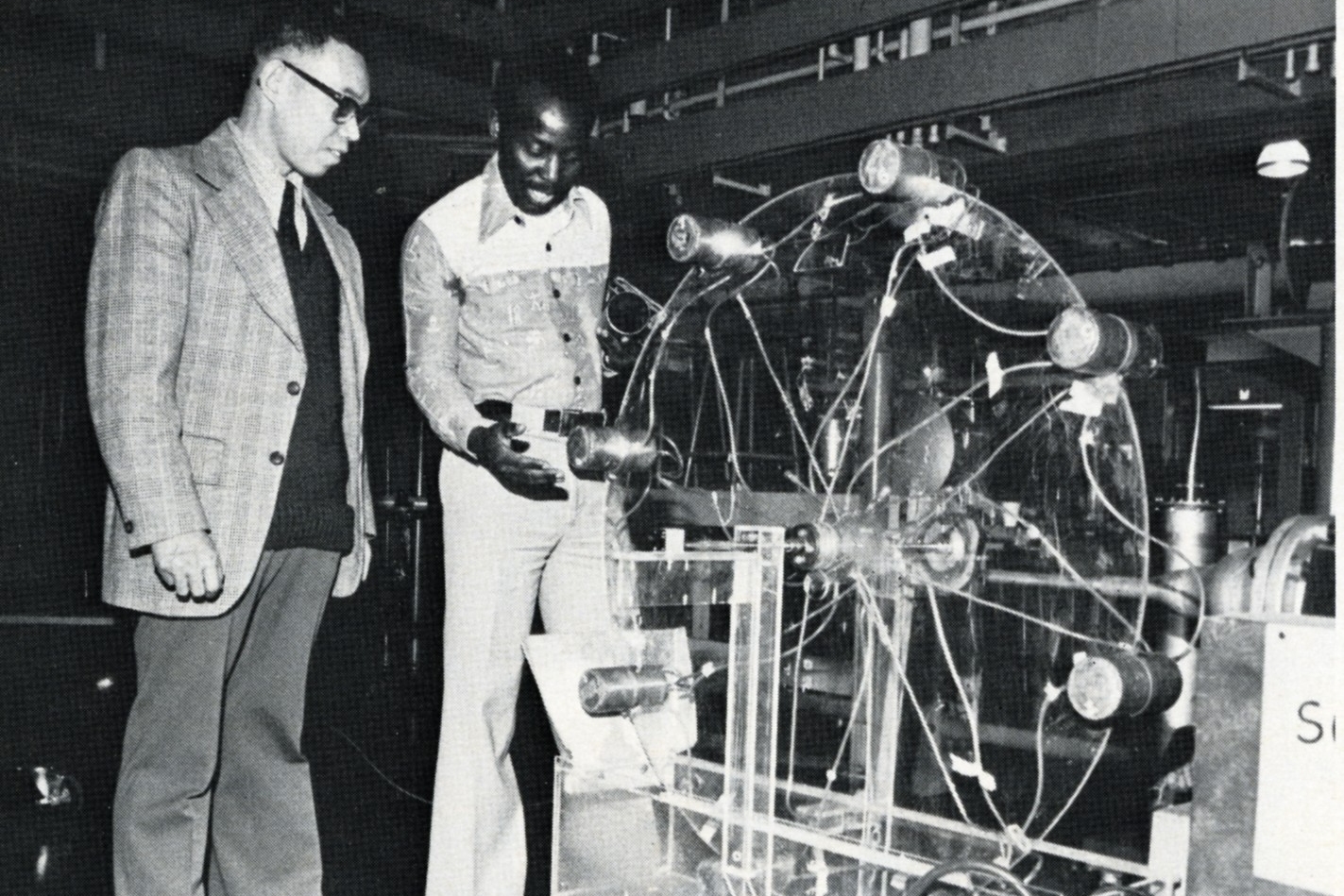 Engineering student in Concordia University yearbook (1979). Source: Concordia University Records Management and Archives
Engineering student in Concordia University yearbook (1979). Source: Concordia University Records Management and Archives
1982
March 26: An article by Rob Clément is published in The Link, a Concordia student-run publication, on “Racism at Concordia.” The article denounces various instances of racism experienced by Black Concordians.
Dr. Esmeralda Thornhill develops and teaches the first university accredited course on Black women’s studies in Canada at Concordia. The course, entitled Black Women: The missing pages from Canadian Women’s Studies, is offered at the Simone de Beauvoir Institute and is given with the support of the Montreal Regional Committee of the National Congress of Black Women in which Thornhill is an active member.
1983
1985
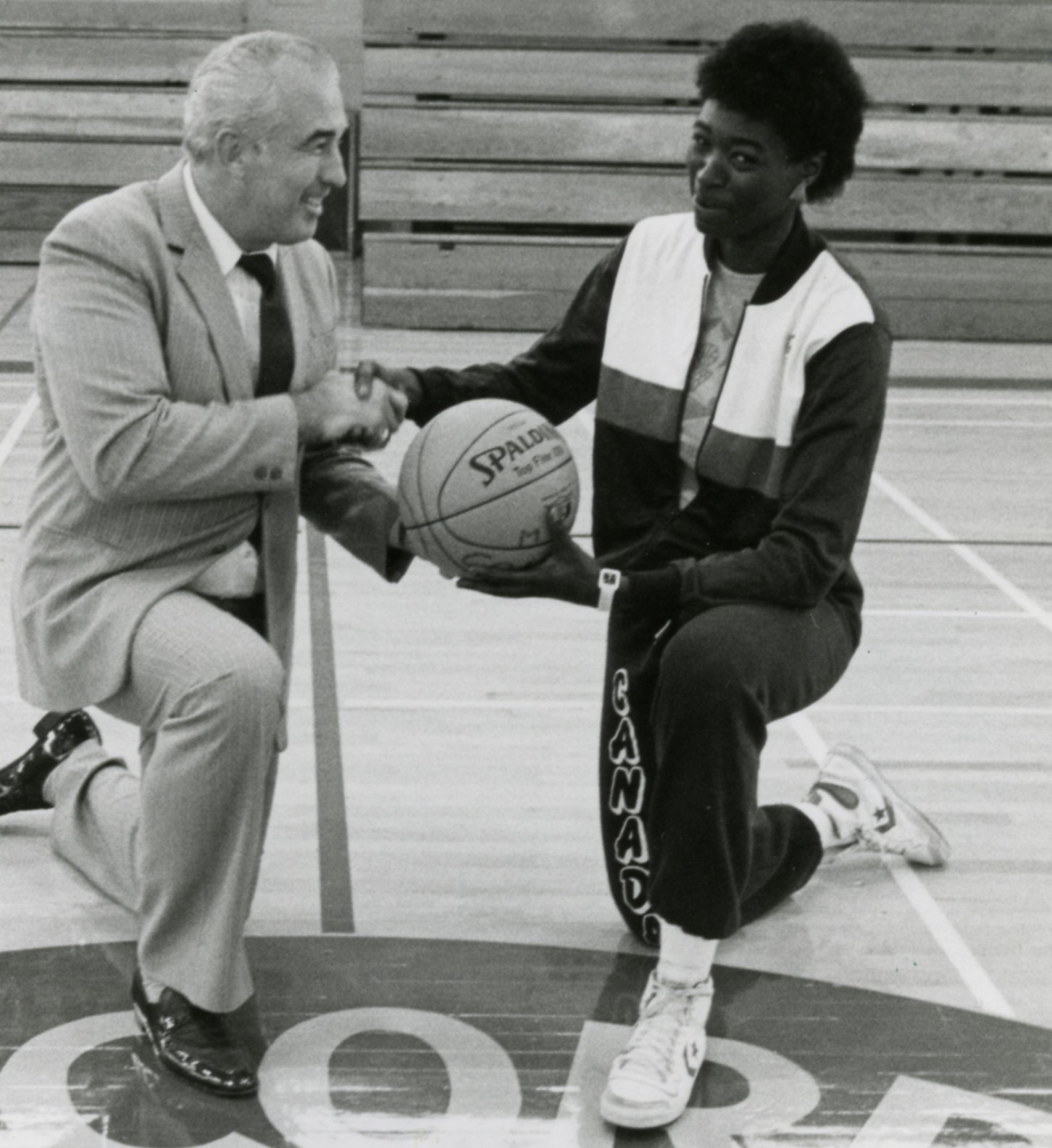 Concordia Olympian basketball player Sylvia Sweeney (1985). Source: Concordia University Records Management and Archives.
Concordia Olympian basketball player Sylvia Sweeney (1985). Source: Concordia University Records Management and Archives.
October 3: The Concordia University Students’ Association (CUSA) launches a human rights lecture series, with the first two weeks being devoted to talks on racism. Dr. Harry Edwards, an Olympic medal winner who led a Black protest during the 1968 Olympic Games, opens the series. This is followed by a talk featuring guest speaker Professor Leonard Jeffries, the director of Black Studies at City College of New York. As part of the women’s rights portion of the series, a lecture is offered by Betty Shabazz, human rights activist and wife of Malcolm X.
The Congress of Black Women of Concordia University is created.
September: The Black Women’s Coalition partners with the Simone de Beauvoir Institute to organize a conference on the Black experience within a feminist context with special guest Dr. bell hooks.
November 21: Four Concordia student groups take part in the march to denounce the killing of an unarmed 19-year-old Black man, Anthony Griffin, by police officer Allan Gosset outside a police station in the Notre-Dame-de-Grâce neighbourhood of Montreal.
1987
1989
February: Task Force on Multiculturalism is set up by Vice-Rector Maurice Cohen.
The African Students Association of Concordia is founded.
Late
1980s
1991
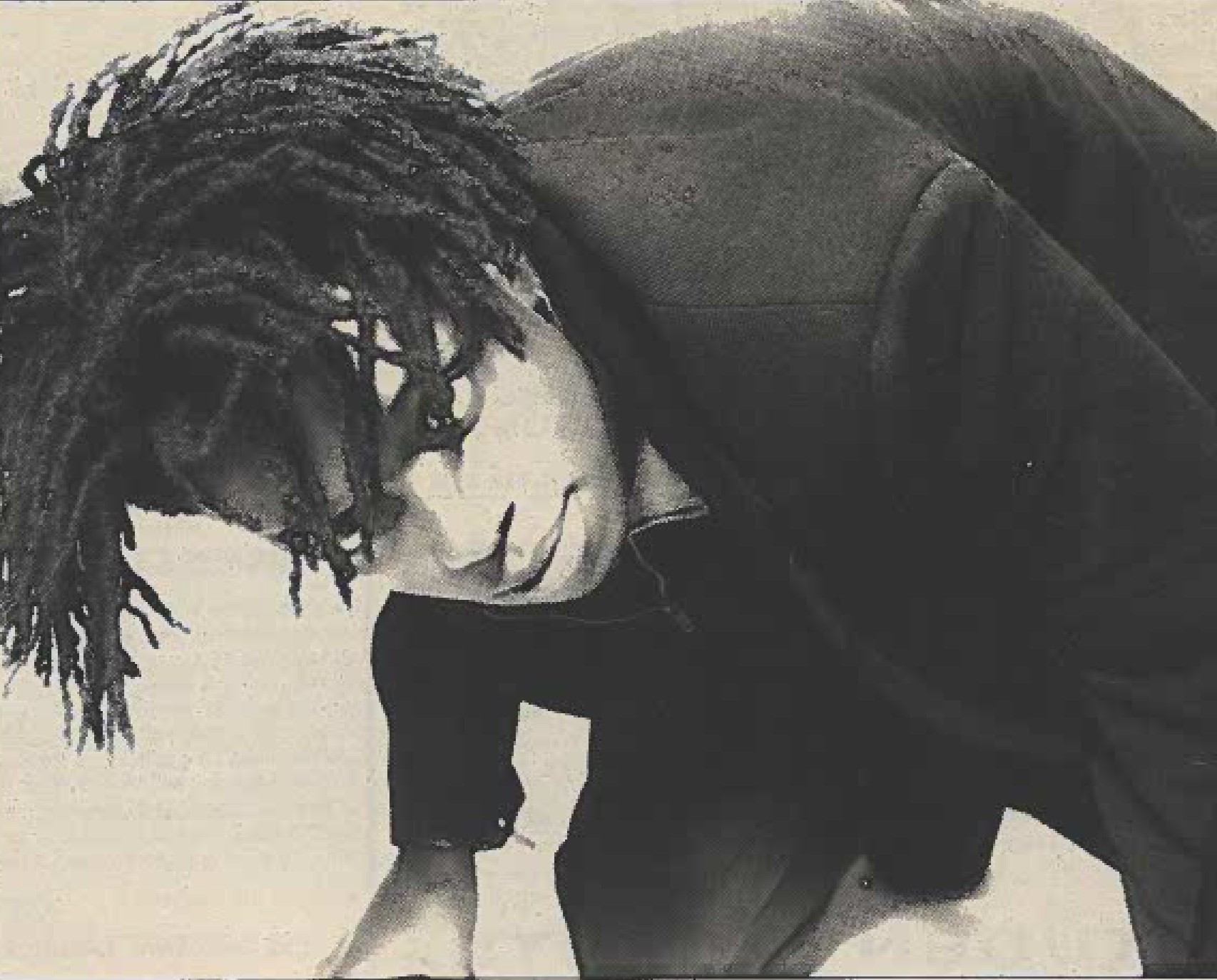 Article on Black Studies in The Link, (February 18, 1992, p.7)
Article on Black Studies in The Link, (February 18, 1992, p.7)
September: The report entitled “Balancing the Equation: Cultural Diversity at Concordia” (hereafter referred to as the Cohen Report) is released. This report stems from the Task Force on Multiculturalism established two years earlier.
The joint Chair in Intercultural and Race Relations Studies, between Concordia University and the Université du Québec à Montreal, is established.
About the image: Article on Black Studies in The Link, (February 18, 1992, p.7).
February 18: An article by Colin Dennis is published in The Link, “Concordia Black Studies far from being programmed.”
March 13: A second article by Colin Dennis is published in The Link, “Fighting for Black Studies.”
May: An Ad-hoc Committee on Multiculturalism and Issues of Equity is created. This committee is a follow-up to the Balancing the Equation report (1991).
1992
1993
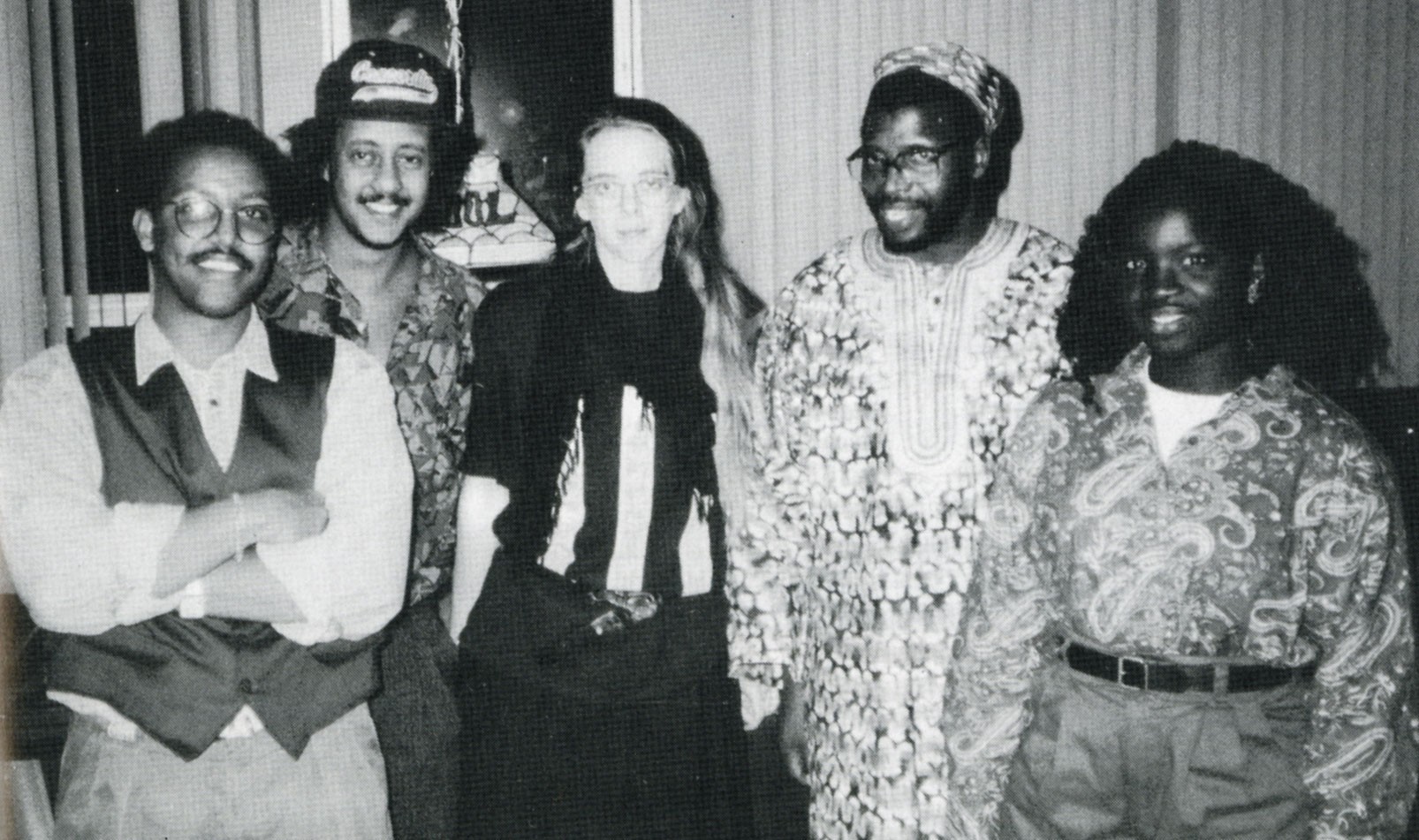 Members of the Anti-Apartheid Movement of Concordia University (1993) Source: Concordia University Records Management and Archives
Members of the Anti-Apartheid Movement of Concordia University (1993) Source: Concordia University Records Management and Archives
February 5: An article by Brady Leddy is published in The Link,
“Lots of talk, little action to begin black studies courses at Concordia.”
An Advisory Committee on Multiculturalism is convened by the Dean of Graduate Studies, Dr. Martin Kusy, and co-chaired by Dr. Clarence Bayne.
1995
1997- 98
This is the start of the Black Community Initiative with the hiring of David McKenzie, the founder and coordinator of the Community Service Initiative, JMSB. The project seeks to initiate and coordinate efforts to recruit and retain undergraduate and graduate students from Montreal’s Black community.
A report entitled the Black Community Initiative Pilot Project: A Partnership for Excellence and Advancement, is prepared by David McKenzie and is presented to Donald L. Boisvert, Dean of Students, Chair, Advisory Committee on Multiculturalism and Issues of Equity.
1999
2016
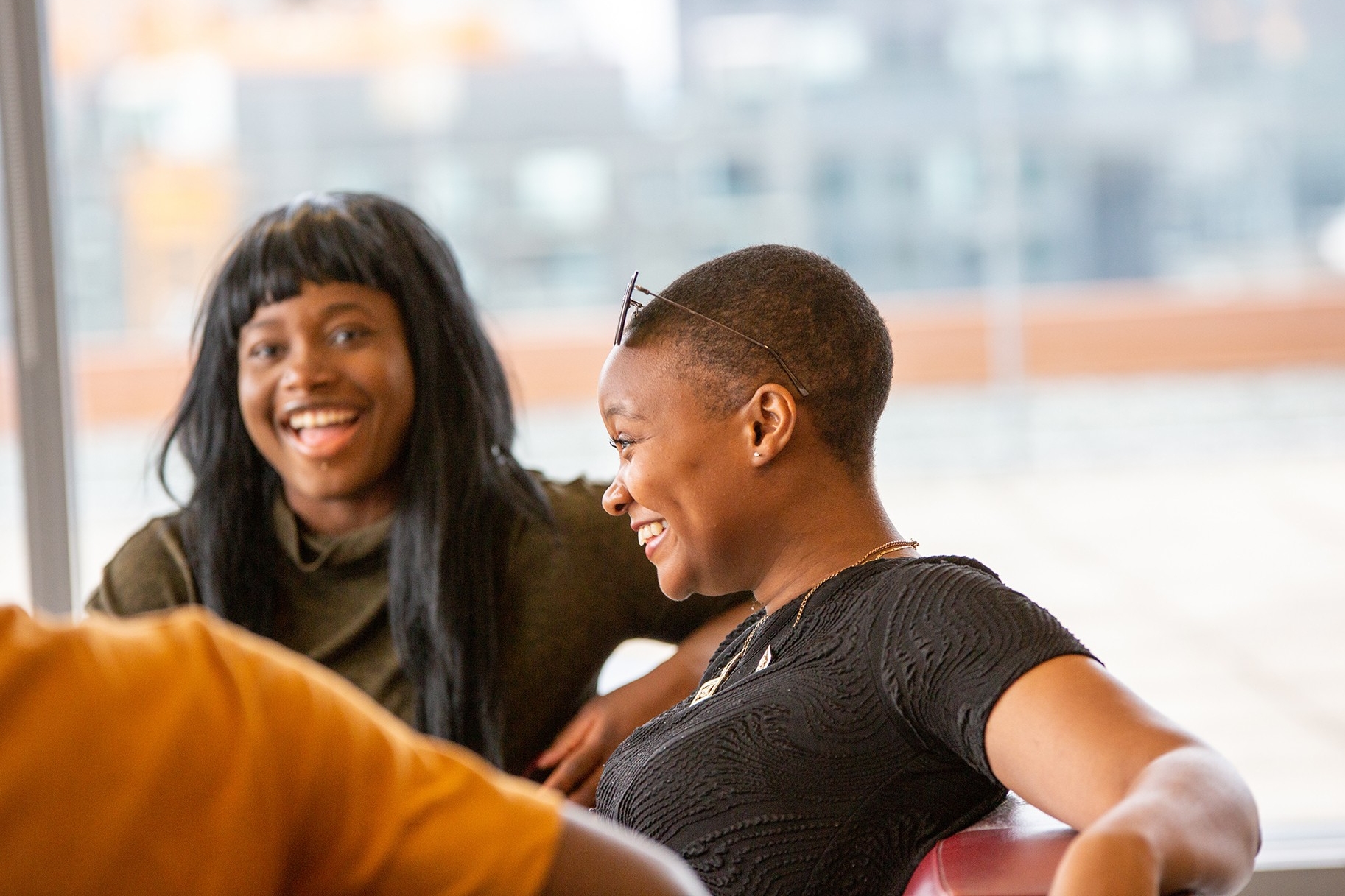
February 9: An article by Shannon Gittens-Yaboha in The Link is entitled “Black Consciousness at Concordia: Why this University Needs an Interdisciplinary Black Studies Minor.”
Mobilization begins for a Black Studies program through the Black Studies at Concordia Collective.
A Black perspectives project is created by Concordia student Annick Maugile Flavien through the Critical Feminist Activism and Research (C-FAR) initiative at the Simone de Beauvoir Institute.
The Black Feminist Futures working group is created.
Concordia’s Black Alumni Network is created by Temi Akin-Aina, Associate Director of Alumni Relations, as a network to connect and support Black alumni, friends, faculty and staff.
December: Paul Joyce, Associate Dean of Academic Programs, in the Faculty of Arts and Science, rejects the proposal for an interdisciplinary minor in Black Studies purportedly due to a lack of specialized Black faculty.
Fall: The fall saw the start of Concordia’s multi-year efforts to consult broadly with the university community on issues of EDI in order to draft recommendations and implement an action plan to address forms of marginalization, discrimination and racism experienced by students, staff and faculty.
2018
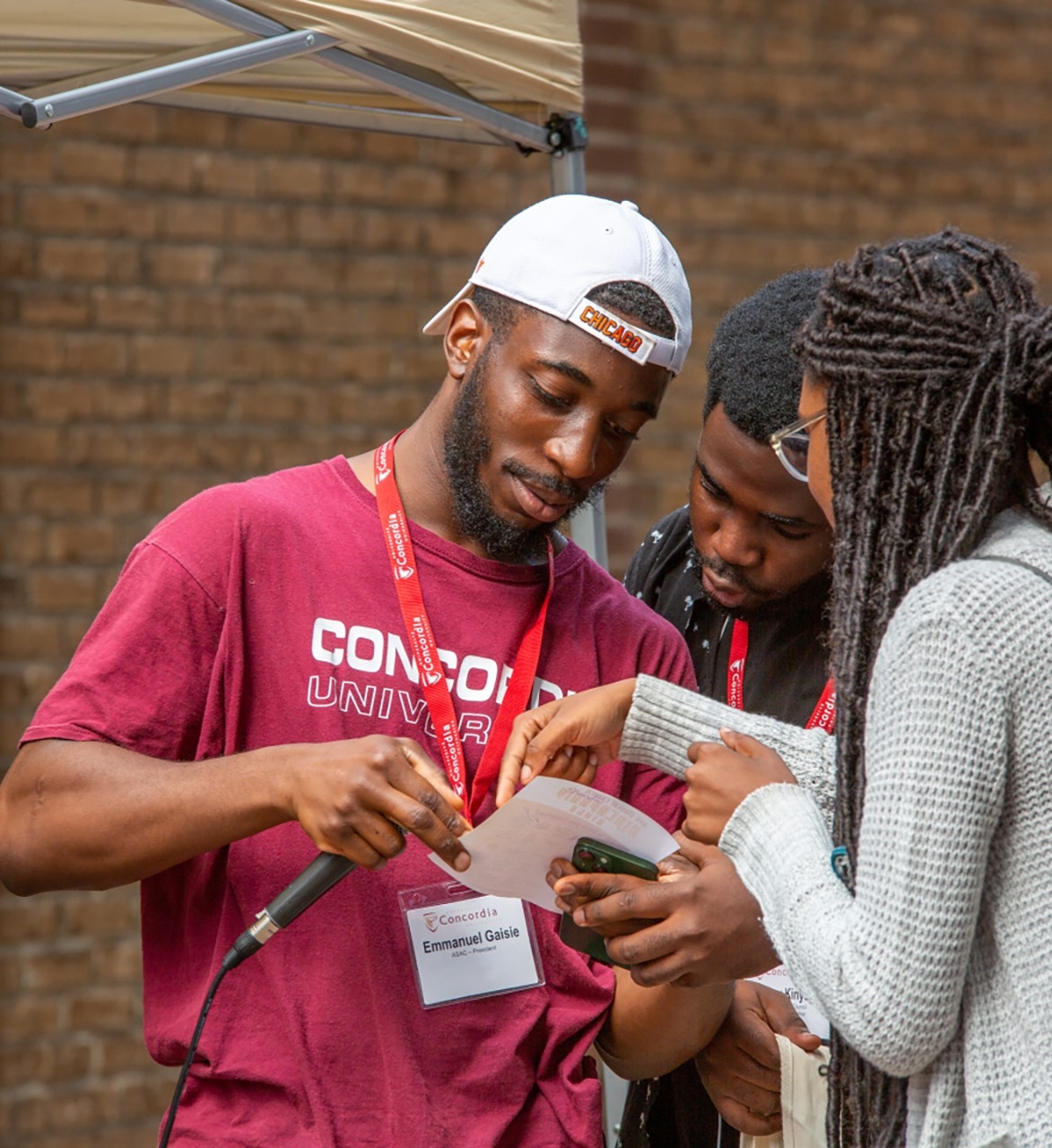
2019
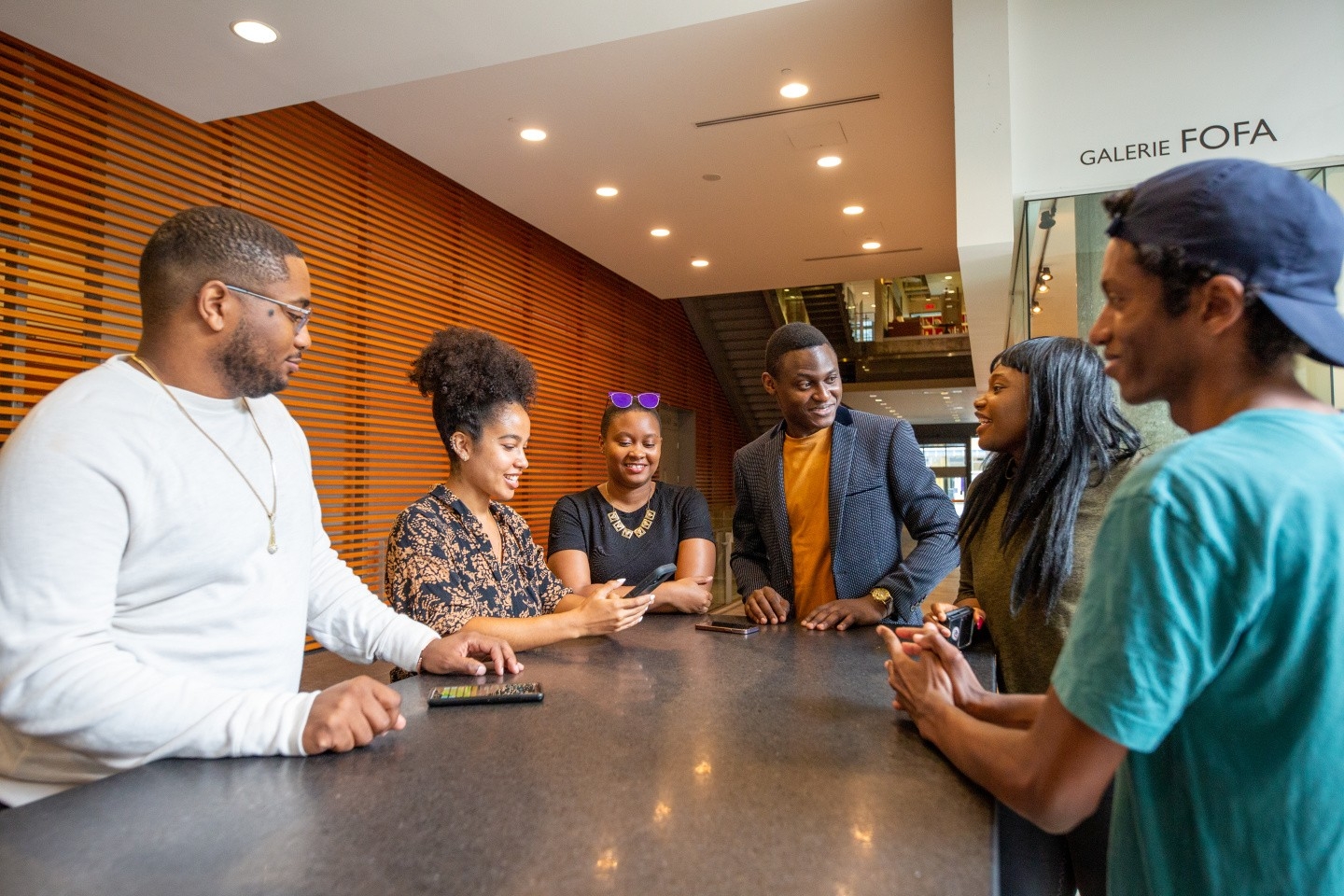
January – February: Protests and Pedagogy presents a series of 19 events commemorating the 50th anniversary of the Sir George Williams affair at Concordia’s 4TH SPACE venue. These events were organized and curated by a collective of university and community partners. The events include an archival exhibition on the student protests of 1969.55
A theatre production by Concordia alumni entitled Blackout: the Concordia Computer Riots is presented. The production reimagines the Sir George Williams affair 50 years later. (Organized by the Concordia Student Union, the Fine Arts Students Association and Tableau D’hôte Theatre.)
March 15 – 16: The conference entitled “Living Black Studies: Reimagining Black Canadian Studies” takes place.
April: There is a follow-up event on the Black Studies curriculum report.
2020
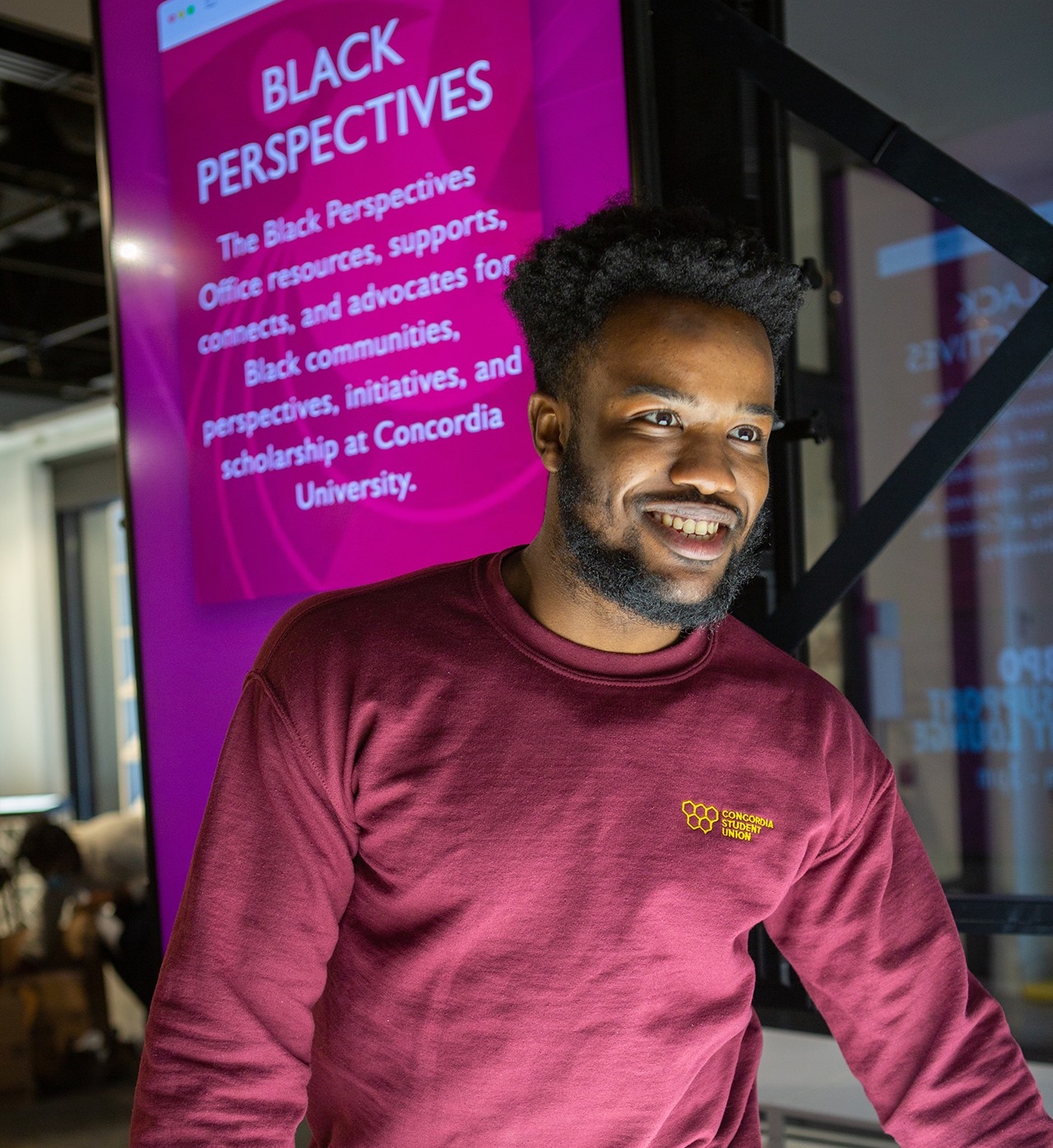
2021
July: The position of Special Advisor to the Provost on Black Integration and Knowledges is created. November: The preliminary report of the President’s Task Force on Anti-Black Racism is published.
1889
Foundation of Loyola College, an extension of an English program at the Jesuit Collège Sainte-Marie de Montréal.
1926
The Montreal YMCA evening adult education program becomes Sir George Williams College.
1947
Montrealer Harold Herbert Potter is hired to teach at Sir George Williams College, becoming the first Canadian-born Black sociologist to be hired by a post-secondary institution in the country. Potter is promoted to assistant professor in 1949 and to full professor in 1963.
1948
Sir George Williams College is officially chartered as a university and becomes Sir George Williams University (SGWU).
1953
The West Indian Society is founded at SGWU.
1960s
The number of students from the Caribbean at SGWU increases, partly due to changes in immigration legislation.
1968
April: Six Black students make a formal report to the Dean of Students, Magnus Flynn, about their experiences of racism in a biology course at SGWU. October 4 – 6: A conference entitled “Problems of Involvement in Canadian Society with Reference to Black Peoples” is held at SGWU. It is organized by the Canadian Conference Committee (formerly Caribbean Conference Committee), which includes SGWU lecturers and students. October 11 – 14: A conference entitled “Congress of Black Writers: Toward the Second Emancipation–The Dynamics of Black Liberation,” is held at McGill University. It is organized by students from McGill University, SGWU and community members. December: An article by Phil Griffin entitled “Black Students’ Association initiates studies program” appears in The Georgian, a SGWU student newspaper. The article describes the initiative and the scheduled program for lectures from guest speakers.32 The proposal for an informal Black Studies program is presented to the co-curriculum committee by Professor C. Davis, Leroy Bucher, and Phil Griffin. The West Indian Society becomes the Caribbean Students Union.
1969
January 17: The first informal Black Studies program is launched by three Black professors in collaboration with Black students in which Black lecturers from the United States are invited to discuss Black identity from the viewpoint of various disciplines. January 29 – February 11: Students occupy the University’s computer centre and faculty lounge in protest of alleged racism at the University. Police are called in on February 11; students are violently arrested. This is followed by lengthy legal trials for those arrested. The day prior to the occupation, The Georgian devotes its entire publication (12 pages) to the position taken by Black students and the university’s response to that position. February 7: An article by Phil Griffin is published in The Georgian. It is entitled “SGWU and the Black Studies program ‘… unresponsive, apathetic” November 5: An article in The Georgian reports on a racist cartoon published in the student journal, The Paper, by its editor and publisher Wayne Gray. The cartoon was termed “the most offensive example of racism ever published at SGWU” by the Executive Committee of the Students’ Association, who formally brought code of conduct charges against Gray. The cartoon depicts two barefooted Black men with spears and a sign that says, “Pack your kit bag, Alfred, they are about to start a Black Studies Program in Sir George.” November 5, 11: A questionnaire is published in The Georgian by the Caribbean Students’ Society of Sir George to determine the interest of students in a Black Studies program at SGWU. November 12: A letter to the editor in The Georgian features a derogatory comment by student John Sedley on Black students’ demands for a Black Studies program.
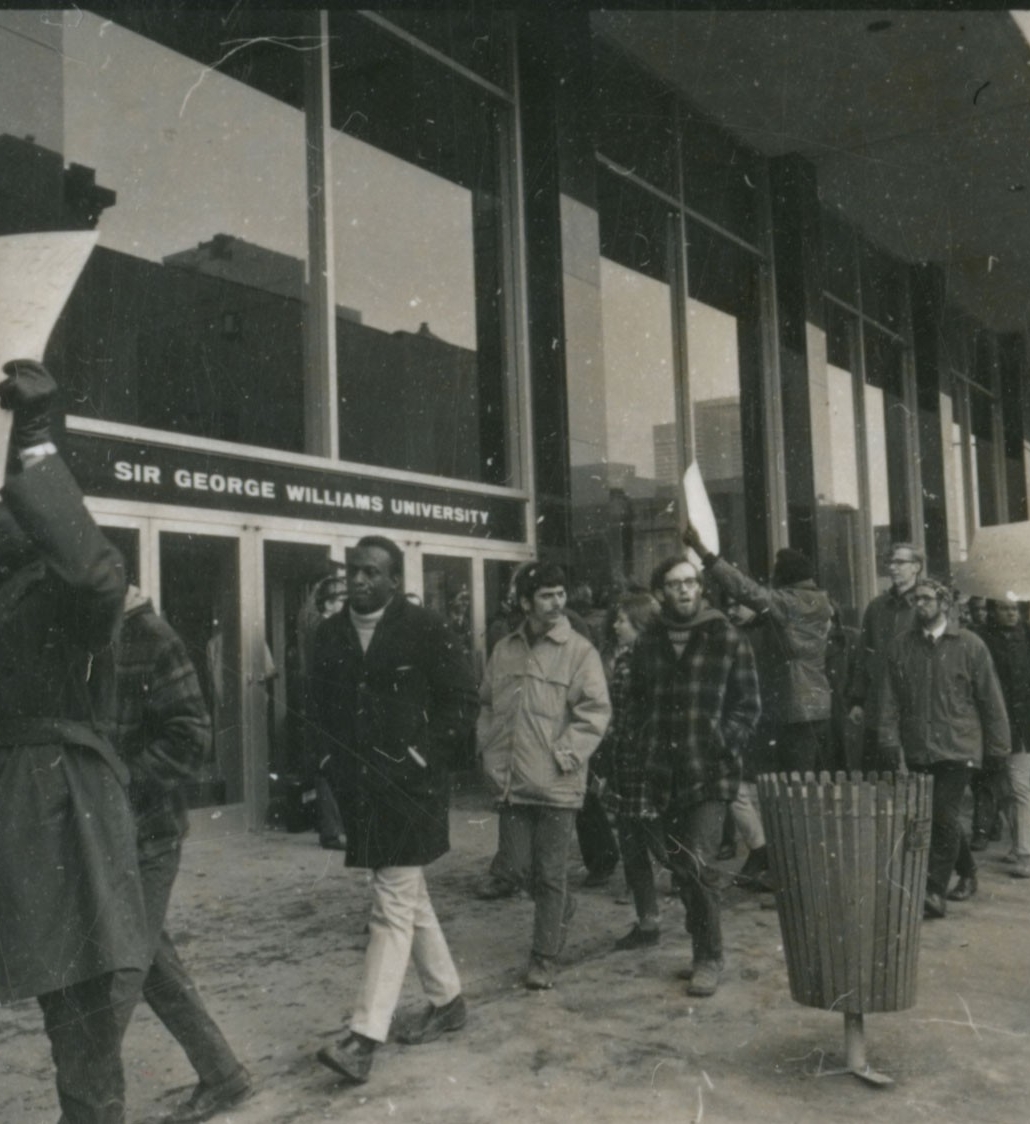 Students protest against racism outside Hall Building at Sir George Williams University (1969) Source: Concordia University Records Management and Archives
Students protest against racism outside Hall Building at Sir George Williams University (1969) Source: Concordia University Records Management and Archives
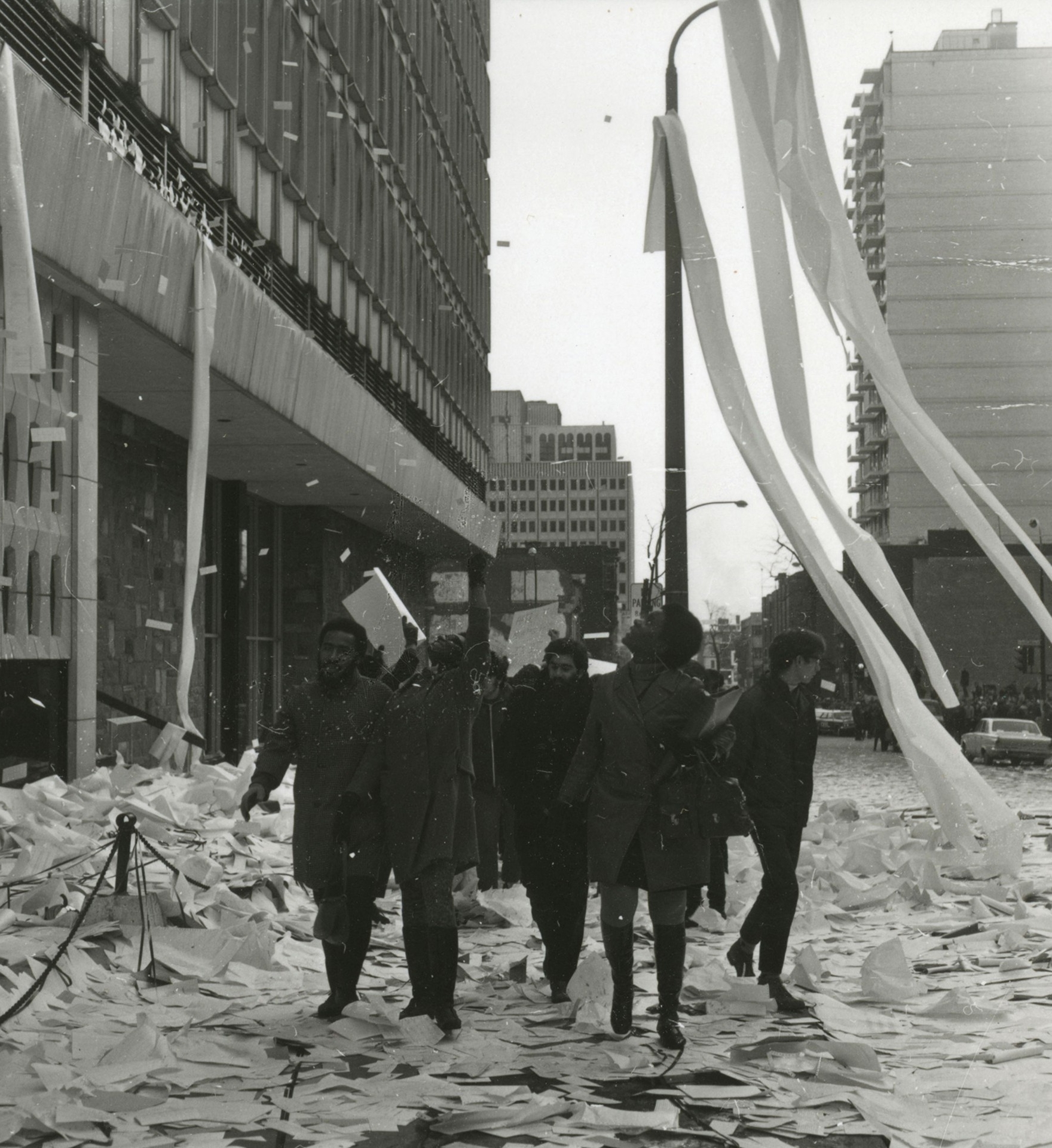 Debris outside the Hall Building following the arrest of protesting students, (February 11, 1969) Source: Concordia University Records Management and Archives
Debris outside the Hall Building following the arrest of protesting students, (February 11, 1969) Source: Concordia University Records Management and Archives
Late 1969
The Black Students’ Association is founded.
1970
January: A report is prepared by James H. Whitelaw (Coordinator of Academic Planning, Sir George Williams University) entitled “Ethnic Groups at the University.” The report delineates the various groups at the university and pays particular attention to the subject of Black Studies. It also lays out the evolution and description of Black Studies programs at other North American universities. January 30: An event is held at SGWU featuring Professor Nathan Hare from Howard University (Washington, D.C.) and Dr. C.L.R. James from SGWU to discuss Black Studies, various types of Black Studies programs and the Black Revolution.
Late 1969: The Black Students’ Association is founded.
1972
February 4: An Afro-American seminar is held at SGWU with Professors Chris Lash, John Swede, Leon Jacobs and Norman Cook discussing Black history and culture.
1973
January: The Black Studies Centre is founded by Dr. Clarence Bayne, an assistant professor of quantitative methods, and by Adrien Espinet and Leighton Hutson. It is initially housed at Concordia University. This initiative develops from a group involved in the Research Institute of the National Black Coalition between 1971 and 1974.
1974
Loyola College and Sir George Williams University merge to found Concordia University.
1977
February 4: 125 students, faculty and administrators from across the university come together in a special seminar series, Roadblocks to Education, to discuss major problems impacting students in university. Among many of the requests, students stress the need for a Black Studies program.
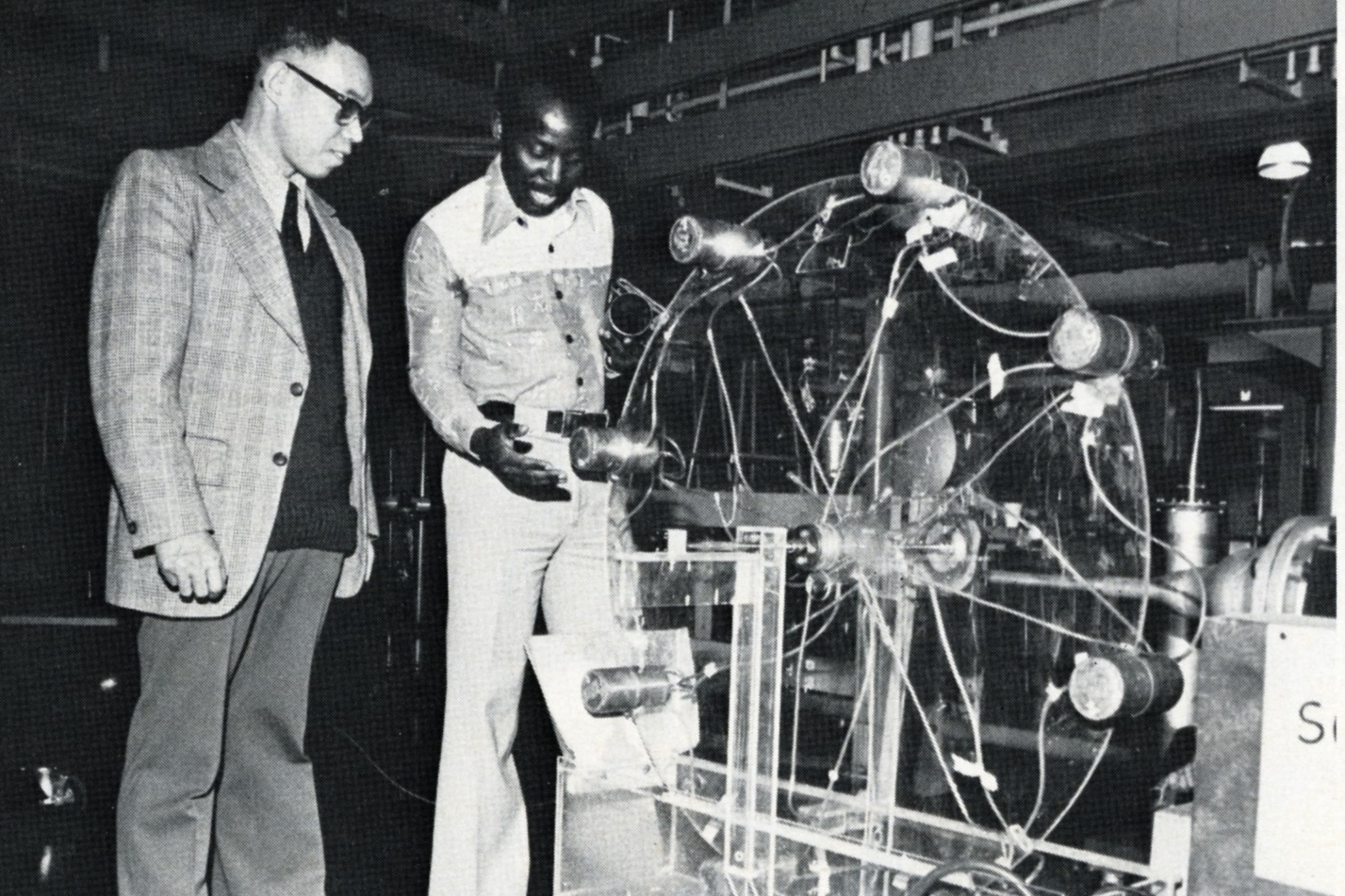 Engineering student in Concordia University yearbook (1979) Source: Concordia University Records Management and Archives.
Engineering student in Concordia University yearbook (1979) Source: Concordia University Records Management and Archives.
1982
March 26: An article by Rob Clément is published in The Link, a Concordia student-run publication, on “Racism at Concordia.” The article denounces various instances of racism experienced by Black Concordians.
1983
Dr. Esmeralda Thornhill develops and teaches the first university accredited course on Black women’s studies in Canada at Concordia. The course, entitled Black Women: The missing pages from Canadian Women’s Studies, is offered at the Simone de Beauvoir Institute and is given with the support of the Montreal Regional Committee of the National Congress of Black Women in which Thornhill is an active member.
1985
October 3: The Concordia University Students’ Association (CUSA) launches a human rights lecture series, with the first two weeks being devoted to talks on racism. Dr. Harry Edwards, an Olympic medal winner who led a Black protest during the 1968 Olympic Games, opens the series. This is followed by a talk featuring guest speaker Professor Leonard Jeffries, the director of Black Studies at City College of New York. As part of the women’s rights portion of the series, a lecture is offered by Betty Shabazz, human rights activist and wife of Malcolm X.
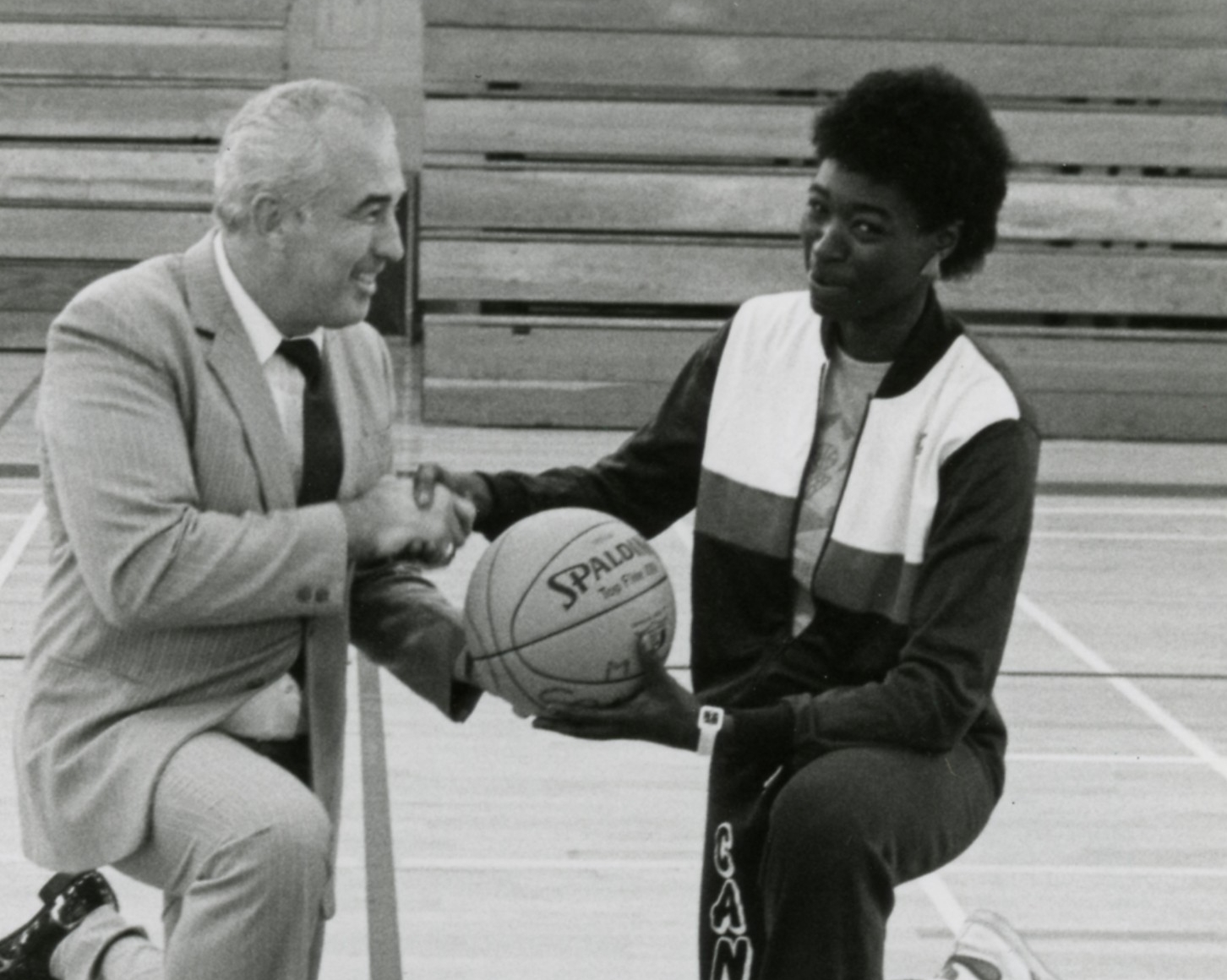 Concordia Olympian basketball player Sylvia Sweeney (1985). Source: Concordia University Records Management and Archives
Concordia Olympian basketball player Sylvia Sweeney (1985). Source: Concordia University Records Management and Archives
1987
The Congress of Black Women of Concordia University is created. September: The Black Women’s Coalition partners with the Simone de Beauvoir Institute to organize a conference on the Black experience within a feminist context with special guest Dr. bell hooks. November 21: Four Concordia student groups take part in the march to denounce the killing of an unarmed 19-year-old Black man, Anthony Griffin, by police officer Allan Gosset outside a police station in the Notre-Dame-de-Grâce neighbourhood of Montreal.
1989
February: Task Force on Multiculturalism is set up by Vice-Rector Maurice Cohen.
Late 1980s
The African Students Association of Concordia is founded.
1991
September: The report entitled “Balancing the Equation: Cultural Diversity at Concordia” (hereafter referred to as the Cohen Report) is released. This report stems from the Task Force on Multiculturalism established two years earlier. The joint Chair in Intercultural and Race Relations Studies, between Concordia University and the Université du Québec à Montreal, is established.
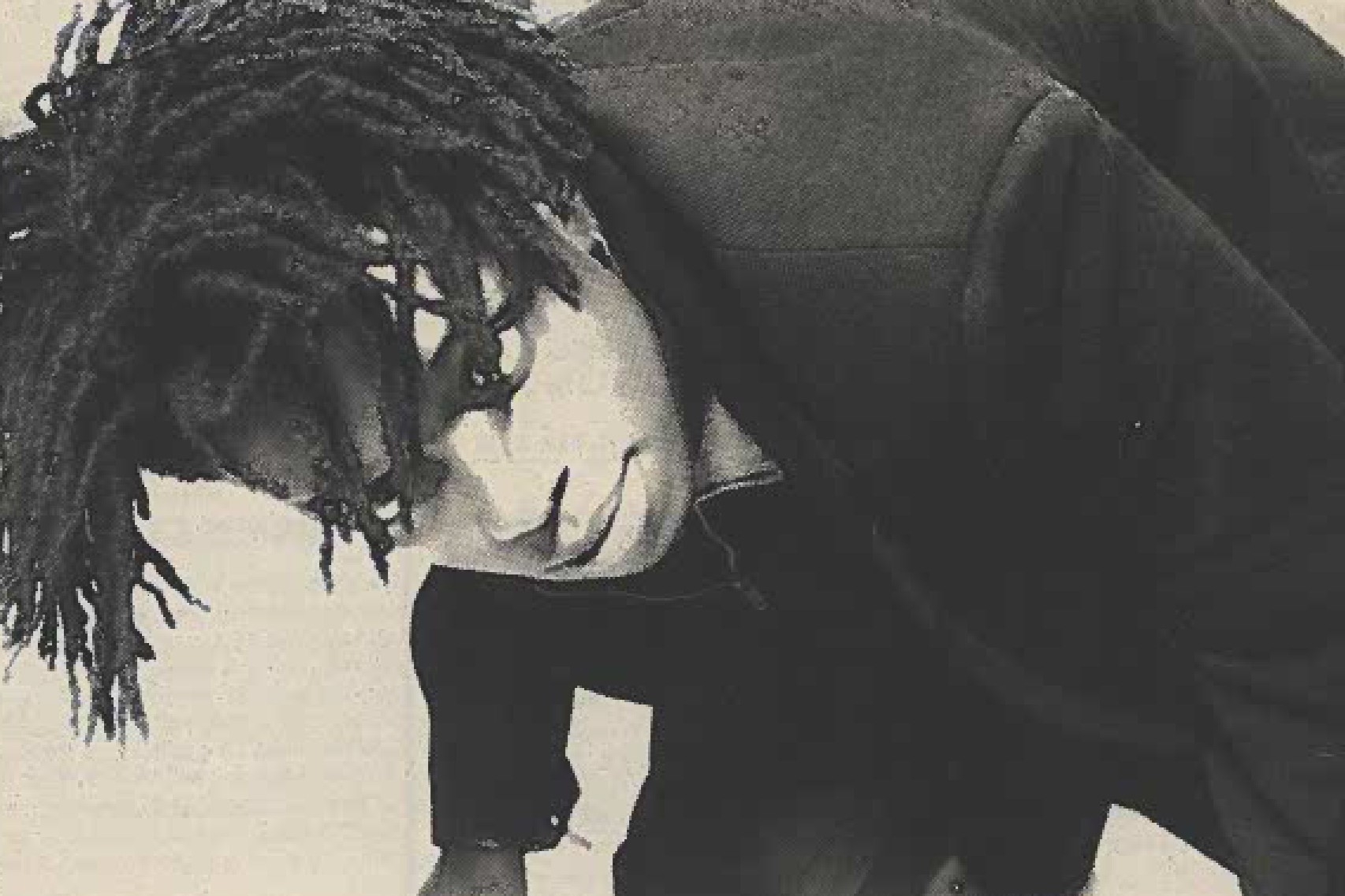 Article on Black Studies in The Link, (February 18, 1992, p.7)
Article on Black Studies in The Link, (February 18, 1992, p.7)
1992
February 18: An article by Colin Dennis is published in The Link, “Concordia Black Studies far from being programmed.” March 13: A second article by Colin Dennis is published in The Link, “Fighting for Black Studies.” May: An Ad-hoc Committee on Multiculturalism and Issues of Equity is created. This committee is a follow-up to the Balancing the Equation report (1991).
1993
February 5: An article by Brady Leddy is published in The Link, “Lots of talk, little action to begin black studies courses at Concordia.”
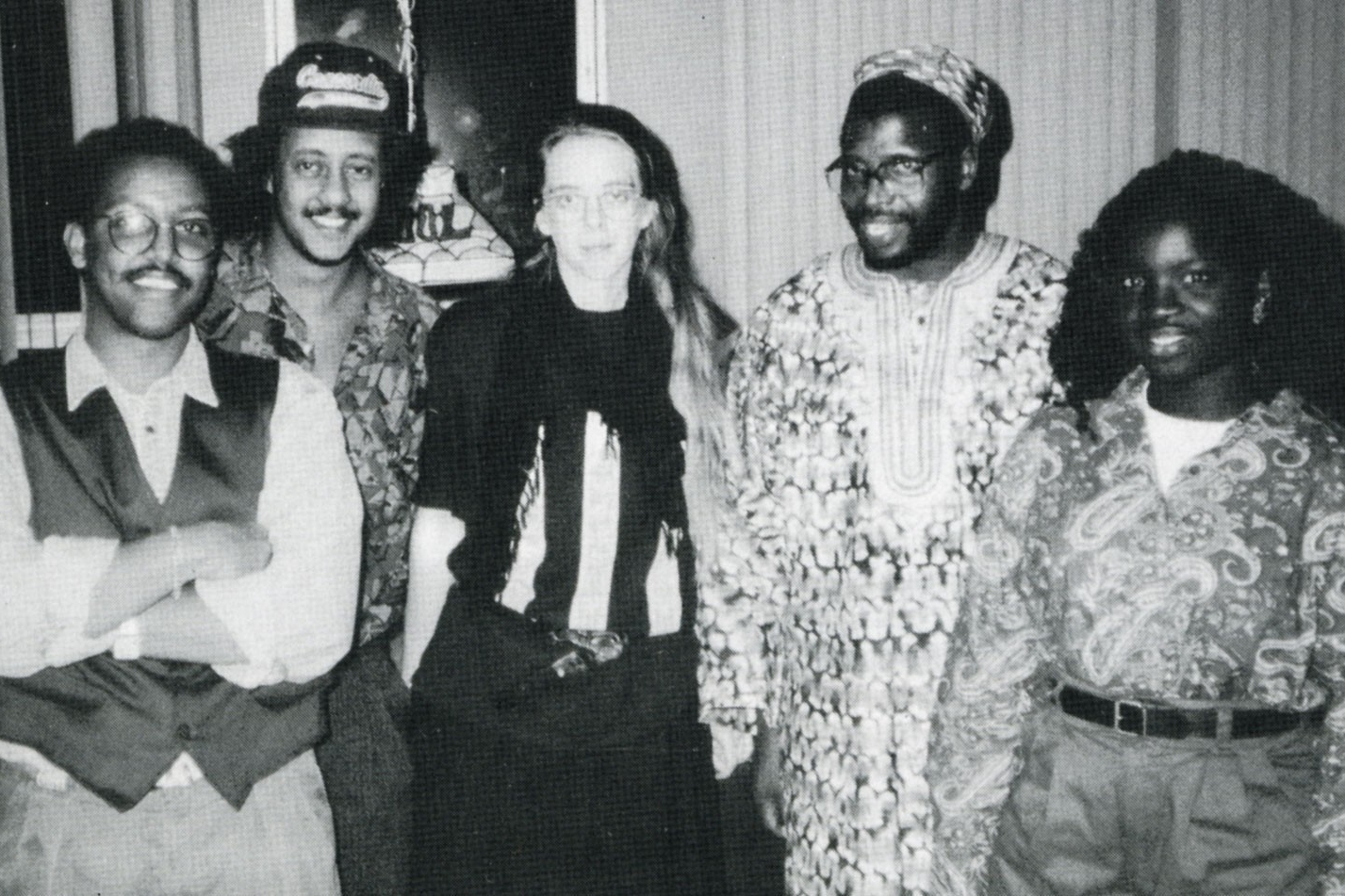 Members of the Anti-Apartheid Movement of Concordia University (1993) Source: Concordia University Records Management and Archives.
Members of the Anti-Apartheid Movement of Concordia University (1993) Source: Concordia University Records Management and Archives.
1995
An Advisory Committee on Multiculturalism is convened by the Dean of Graduate Studies, Dr. Martin Kusy, and co-chaired by Dr. Clarence Bayne..
1997-98
This is the start of the Black Community Initiative with the hiring of David McKenzie, the founder and coordinator of the Community Service Initiative, JMSB. The project seeks to initiate and coordinate efforts to recruit and retain undergraduate and graduate students from Montreal’s Black community.
1999
A report entitled the Black Community Initiative Pilot Project: A Partnership for Excellence and Advancement, is prepared by David McKenzie and is presented to Donald L. Boisvert, Dean of Students, Chair, Advisory Committee on Multiculturalism and Issues of Equity.
2016
February 9: An article by Shannon Gittens-Yaboha in The Link is entitled “Black Consciousness at Concordia: Why this University Needs an Interdisciplinary Black Studies Minor.” Mobilization begins for a Black Studies program through the Black Studies at Concordia Collective. A Black perspectives project is created by Concordia student Annick Maugile Flavien through the Critical Feminist Activism and Research (C-FAR) initiative at the Simone de Beauvoir Institute.

2018
The Black Feminist Futures working group is created. Concordia’s Black Alumni Network is created by Temi Akin-Aina, Associate Director of Alumni Relations, as a network to connect and support Black alumni, friends, faculty and staff. December: Paul Joyce, Associate Dean of Academic Programs, in the Faculty of Arts and Science, rejects the proposal for an interdisciplinary minor in Black Studies purportedly due to a lack of specialized Black faculty. Fall: The fall saw the start of Concordia’s multi-year efforts to consult broadly with the university community on issues of EDI in order to draft recommendations and implement an action plan to address forms of marginalization, discrimination and racism experienced by students, staff and faculty.
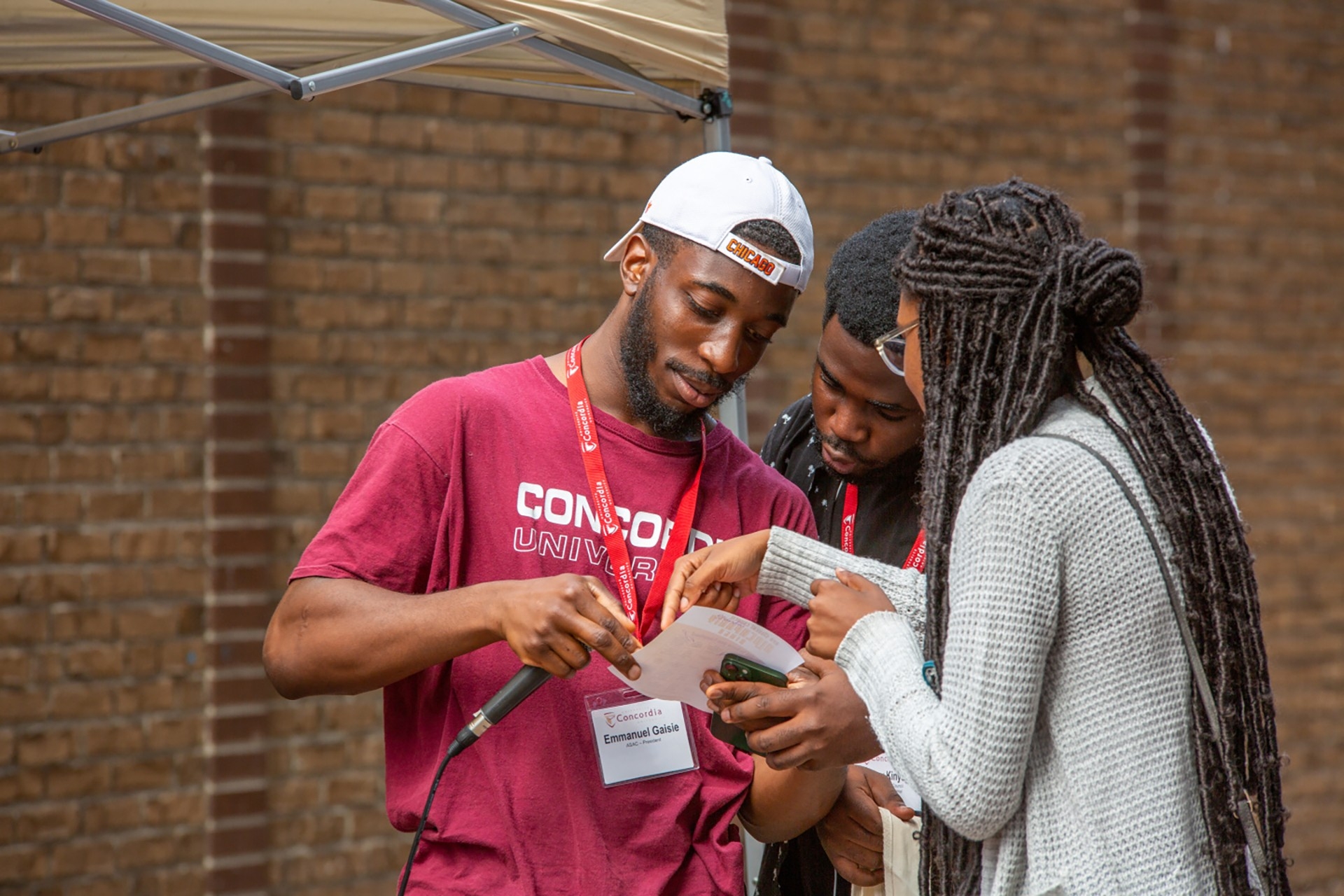
2019
January – February: Protests and Pedagogy presents a series of 19 events commemorating the 50th anniversary of the Sir George Williams affair at Concordia’s 4TH SPACE venue. These events were organized and curated by a collective of university and community partners. The events include an archival exhibition on the student protests of 1969.55 A theatre production by Concordia alumni entitled Blackout: the Concordia Computer Riots is presented. The production reimagines the Sir George Williams affair 50 years later. (Organized by the Concordia Student Union, the Fine Arts Students Association and Tableau D’hôte Theatre.) March 15 – 16: The conference entitled “Living Black Studies: Reimagining Black Canadian Studies” takes place. April: There is a follow-up event on the Black Studies curriculum report.
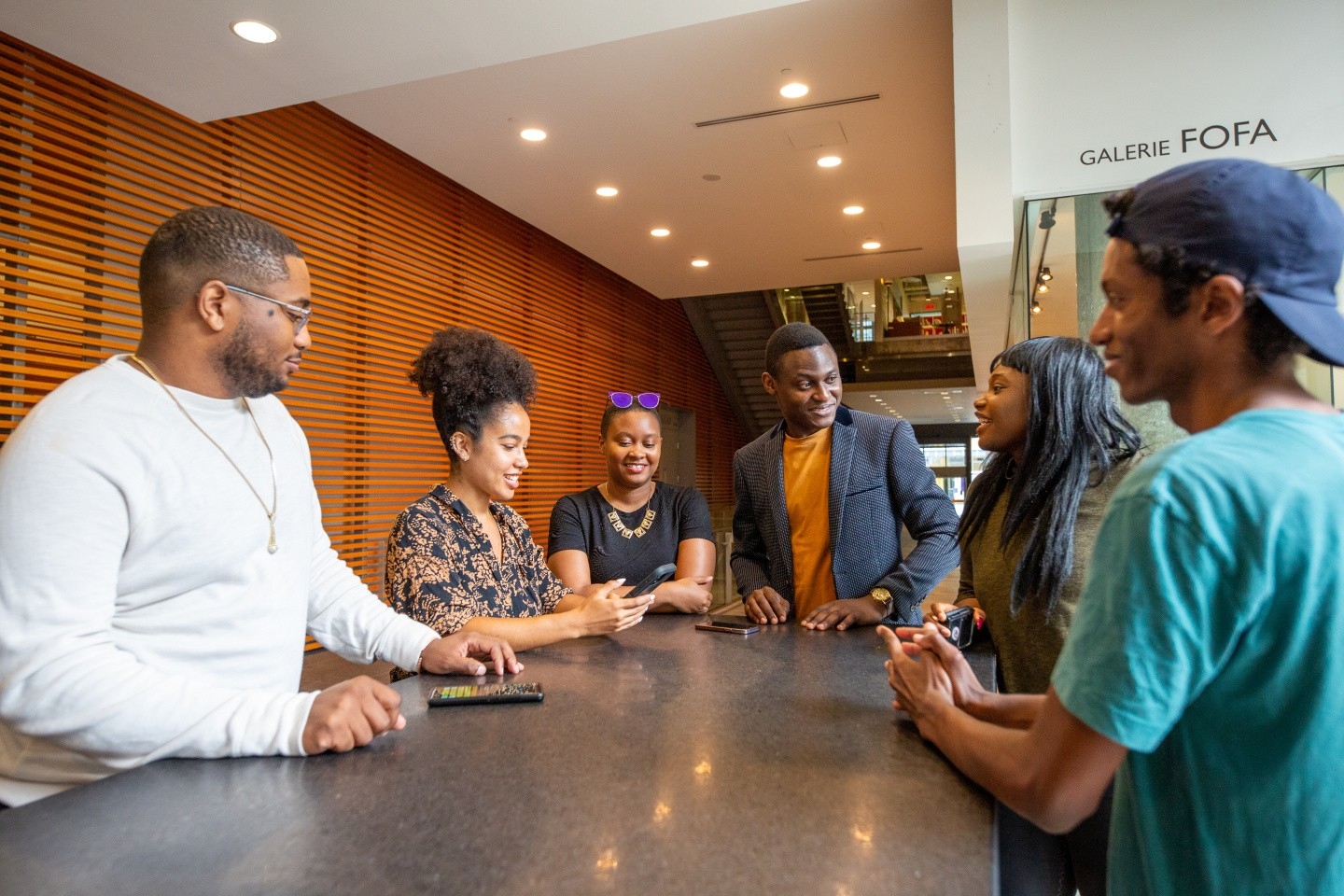
2020
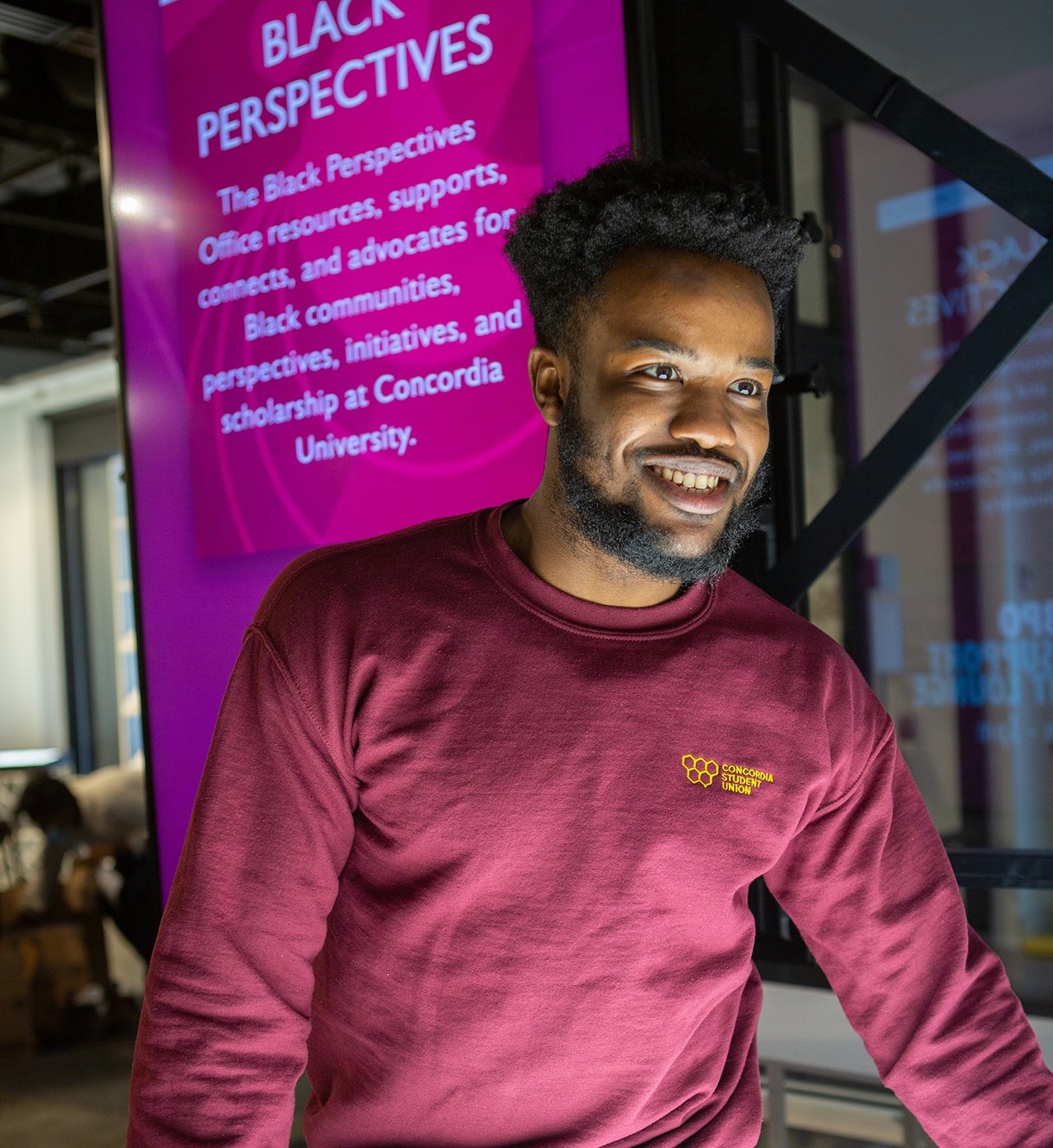
2021

The Task Force recommendations are a place to start. However, they are necessarily only one piece of the university’s ongoing decolonial project and they must be seen as adaptive, iterative and evolving. As the process of implementation across university structures advances, the recommendations will need to be revisited, goals reformulated, targets reset. The voices of Black Concordians must guide this revisiting, but the work of doing must not be ours. In order to successfully engage the entire Concordia community and build on relationships of trust and confidence, the transparency of this exercise is essential. The 2021 Congress Advisory Committee on Equity, Diversity, Inclusion, and Decolonization of the Federation for the Humanities and Social Sciences was explicit that institutions will need to make clear what is desired and aspired to, what actions they will take, and how they will react in response to racism in any form from here on out.